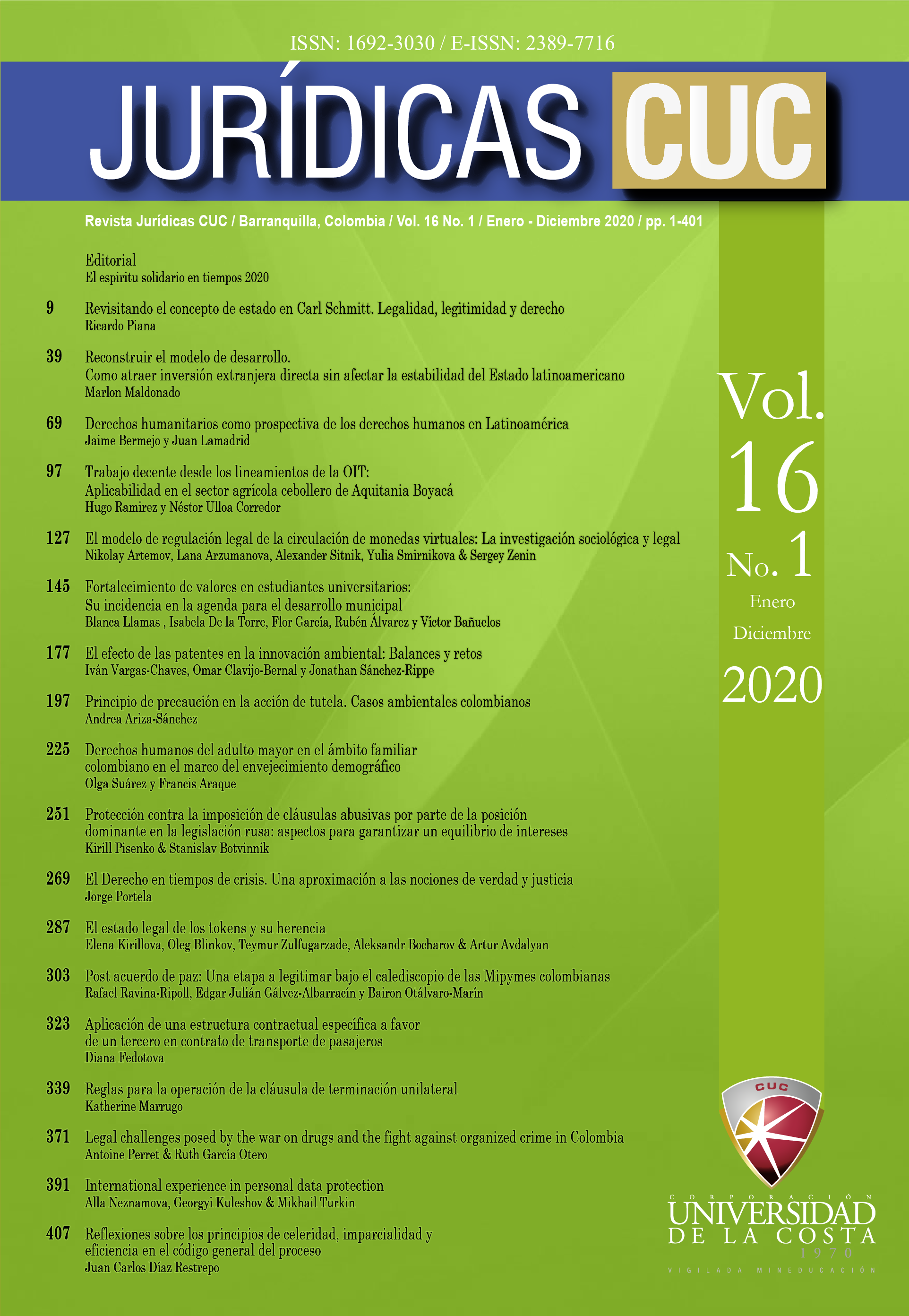The legal status of tokens and their inheritance
DOI:
https://doi.org/10.17981/juridcuc.16.1.2020.12Keywords:
Blockchain technology, cryptocurrency, digital technologies, heir, legal status, tokenAbstract
This article considers the legal status of tokens, their specifics and distinctive features, as well as the possibility of inheriting this digital asset. The study aims at analyzing the legal nature and classification of tokens, as well as the specifics of their inheritance. While conducting this research, it has been used the methods of collecting and studying singularities, generalization, scientific abstraction, cognition of objective laws, objectivity, specificity and pluralism. It has been concluded that a token is an entry in the transaction block registry (blockchain) or other distributed information systems, which certifies that the token owner is entitled to civil law protections and/or is a cryptocurrency. It has been proved that tokens by their legal nature are digital units of accounting in the participating interest shares of entrepreneurial projects and authorized capitals of any company, digital price analogues of uncertificated securities and other objects of civil law. It has been developed a classification of tokens and emphasized the need to create an electronic data warehouse that contains access codes for these digital assets. After the testator’s death, these codes can be given to the heir by testament or by law in case the testator did not draw up the corresponding testament during their life. These conclusions and suggestions will allow to legally qualify tokens and resolve inheritance issues in this area.
Downloads
References
Bryans, D. (2014). Bitcoin and money laundering: mining for an effective solution. Indiana Law Journal, 89(1), 441–472. Available from https://www.repository.law.indiana.edu/ilj/vol89/iss1/13/
Ciaian, P. and Rajcaniova, M. (2018). Virtual relationships: short- and long-term evidence from BitCoin and altcoin markets. Journal of International Financial Markets, Institutions and Money, 52(1), 173–195. https://doi.org/10.1016/j.intfin.2017.11.001
Corbet, S., Lucey, B., Urquhart, A. and Yarovaya, L. (2019). Cryptocurrencies as a financial asset: A systematic analysis. International Review of Financial Analysis, 62(C), 182–199. https://doi.org/10.1016/j.irfa.2018.09.003
Davidson, L. and Block, W. (2015). Bitcoin, the regression theorem, and the emergence of a new medium of exchange. The Quarterly Journal of Austrian Economics, 18(3), 311–338. Available from https://mises.org/library/bitcoin-regression-theorem-and-emergence-new-medium-exchange
de Graaf, T. J. (2019). From old to new: From internet to smart contracts and from people to smart contracts. Computer Law & Security Review, 35(5), 105322. Available from http://hdl.handle.net/1887/80378
Grinberg, R. (2011). Bitcoin: an innovative alternative digital currency. Hastings Science & Technology Law Journal, 4(1), 159–208. Available from https://repository.uchastings.edu/hastings_science_technology_law_journal/vol4/iss1/3/
Gürkaynak, G., Yılmaz, İ., Yeşilaltay, B. and Bengi, B. (2018). Intellectual property law and practice in the blockchain realm. Computer Law & Security Review, 34(4), 847–862. https://doi.org/10.1016/j.clsr.2018.05.027
Janssen, M., Weerakkody, V., Ismagilova, E., Sivarajah, U. & Irani, Z. (2020). A framework for analyzing blockchain technology adoption: Integrating institutional, market and technical factors. International Journal of Information Management, 50(1), 302–309. https://doi.org/10.1016/j.ijinfomgt.2019.08.012
Kirillova, E. A., Pavlyuk, A. V., Zulfugarzade, T. & Mikhailova, I. A. (2018). Bitcoin, lifecoin, namecoin: the legal nature of virtual currency. Journal of Advanced Research in Law and Economics, 9(1), 119–126. https://doi.org/10.14505//jarle.v9.1(31).16
Kotlyarov, S. B. (2018). Correlation of the notions of "law" and "legal procedure". Law and Education, (2), 44–49. Available from https://elibrary.ru/item.asp?id=32382027
Lorne, F., Daram, S., Frantz, R., Kumar, N., Mohammed, A. and Muley, A. (2018). Blockchain Economics and Marketing. Journal of Computer and Communications, 6(2), 107–117. https://doi.org/10.4236/jcc.2018.612011
Low, K. F. K. and Teo, E. (2018). Chapter 10: Legal Risks of Owning Cryptocurrencies. In, D. Lee & R. Deng (eds.), Handbook of Blockchain, Digital Finance, and Inclusion, Vol. 1, (pp. 225–247). London: Elsevier. https://doi.org/10.1016/B978-0-12-810441-5.00010-5
Mazzorana-Kremer, F. (2019). Blockchain-Based Equity and STOs: Towards a Liquid Market for SME Financing? Theoretical Economics Letters, 9(5), 1534–1552. https://doi.org/10.4236/tel.2019.95099
McKinney, R. E., Shao, L. P., Rosenlieb, D. C. and Shao, D. H. (2015). Chapter 8 - Counterfeiting in Cryptocurrency: An Emerging Problem. In, D. Lee (ed.), Handbook of Digital Currency, (pp. 173–187). San Diego: Elsevier. https://doi.org/10.1016/B978-0-12-802117-0.00008-4
Nofer, M., Gomber, P., Hinz, O. & Schiereck, D. (2017). Blockchain. Business & Information Systems Engineering, 59(3), 183–187. https://doi.org/10.1007/s12599-017-0467-3
Savelyev, A. (2018). Some risks of tokenization and blockchainizaition of private law. Computer Law & Security Review, 34(4), 863–869. https://doi.org/10.1016/j.clsr.2018.05.010
Shanaev, S., Sharma, S., Ghimire, B. and Shuraeva, A. (2020). Taming the blockchain beast? Regulatory implications for the cryptocurrency Market. Research in International Business and Finance, 51, 101080. https://doi.org/10.1016/j.ribaf.2019.101080
Sullivan, C. (2018). Digital identity – From emergent legal concept to new reality. Computer Law & Security Review, 34(4), 723–731. https://doi.org/10.1016/j.clsr.2018.05.015
Vandezande, N. (2017). Virtual currencies under EU anti-money laundering law. Computer Law & Security Review, 33(3), 341–353. https://doi.org/10.1016/j.clsr.2017.03.011
Wang, Y., Liu, Q., Guan, B. and Sui, X. (2015). The New Open Economy Macroeconomics of Working Habits. Theoretical Economics Letters, 5, 125–131. https://doi.org/10.4236/tel.2015.51017
Zachariadis, M., Hileman, G. and Scott, S. V. (2019). Governance and control in distributed ledgers: Understanding the challenges facing blockchain technology in financial services. Information and Organization, 29(2), 105–117. https://doi.org/10.1016/j.infoandorg.2019.03.001
Zharova, A. and Ian, L. (2018). An examination of the experience of cryptocurrency use in Russia. In search of better practice. Computer Law & Security Review, 34(6), 1300–1313. https://doi.org/10.1016/j.clsr.2018.09.004
Published
How to Cite
Issue
Section
License
Copyright (c) 2020 JURIDICAS CUC

This work is licensed under a Creative Commons Attribution-NonCommercial-NoDerivatives 4.0 International License.
The authors are exclusively responsible for the published articles, which do not necessarily reflect the views of the editorial committee.
JURIDICAS CUC respects the moral rights of authors who have assigned the property rights on the published materials to the editorial committee. In turn, the authors declare that the work they submit has not been previously published.


 English
English
 Español (España)
Español (España)



